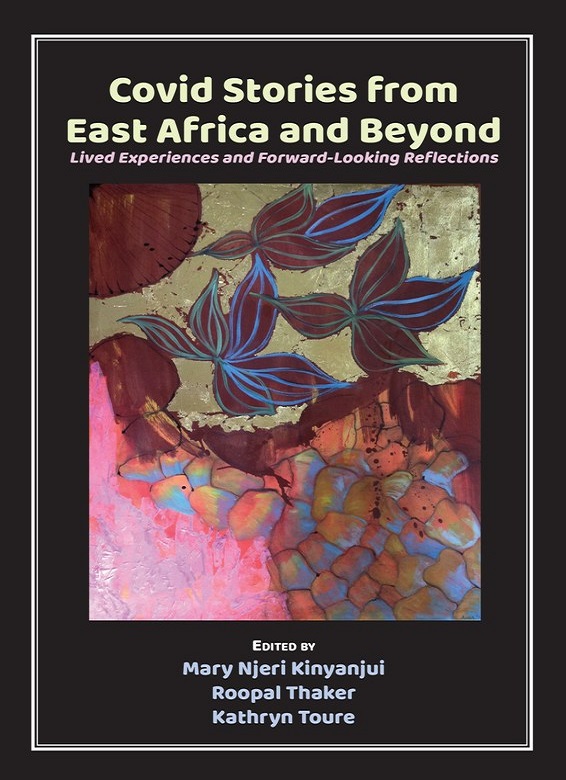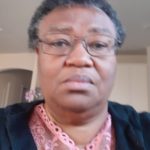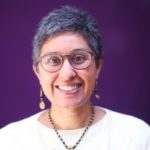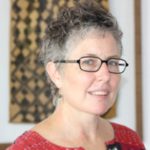edited by Mary Njeri Kinyanjui, Roopal Thaker and Kathryn Toure
Lived Experiences and Forward-Looking Reflections
The coronavirus has rattled humanity, tested resolve and determination, and redefined normalcy. This compelling collection of 29 short stories and essays brings together the lived experiences of covid19 through a diversity of voices from across the African continent. The stories highlight challenges, new opportunities, and ultimately the deep resilience of Africans and their communities. Bringing into conversation the perspectives of laypeople, academics, professionals, domestic workers, youth, and children, the volume is a window into the myriad ways in which people have confronted, adapted to, and sought to tackle the coronavirus and its trail of problems. The experiences of the most vulnerable are specifically explored, and systemic changes and preliminary shifts towards a new global order are addressed. Laughter as a coping mechanism is a thread throughout.
Reviews
“African women and men tell their stories, rich in the value systems of our cultures.” – Fatma Alloo, Founder, Tanzania Media Women’s Association (TAMWA)
“In these times of change, Africa can help us understand how to live more fully.” – Joanna Grace Farmer, Building Community Capacity… Remembering our Legacy of Love
“These ordinary voices will open your eyes.” – Michèle Foster, Professor and Henry Heuser Jr. Endowed Chair, University of Louisville
“Brilliant and timely – from stories of everyday life to reflections on structural issues.” – Sitawa Namwalie, Kenyan Poet, Playwright and Performer
“These covid stories resonate with experiences here in West Africa.” – Adwoa Agyeman, Social change strategist and co-founder of EPIC-Africa
“Gripping, inspiring, thoughtful – about the present and the future.” – Virginia R. Dominguez, Gutgsell Professor of Anthropology, University of Illinois at Urbana
“A new normal must-read…” – Karindi Odindo, Psychologist and Conflict Transformation Counsellor
“Revelatory of responding to covid19 with resilience and creativity.” – James Giblin, African History Professor, and Blandina Kaduma Giblin, Kiswahili Lecturer, University of Iowa
| ISBN | 9789956551545 |
| Pages | 312 |
| Dimensions | 229 x 152mm |
| Published | 2020 |
| Publisher | Langaa RPCIG, Cameroon |
| Format | Paperback |
Table of Contents
Responding rapidly |
||
| 1 | The Covid Outlaw | Didi Wamukoya |
| 2 | What I Learned Surviving the Apocalypse | Awuor Onguru |
| 3 | Emotional Highs and Lows of Quarantine | Susan Karungi |
| 4 | Making Covid19 Manageable with Gospel Music | Catherine Mongella-Kalokola |
| 5 | School Closure and Panic Mode | Meseret Kassahun Desta |
| 6 | What Is It Like Working in a Hospital during the Covid Pandemic? | Toseef Din |
| 7 | Covid in Africa: Keeping it Hopeful | Margaret LoWilla |
Adapting to new realities |
||
| 8 | Coronavirus: Retracing Our Steps Back to the Home | Mary Njeri Kinyanjui |
| 9 | Covid Dating and Anti-Social Cues | Nyawira Muraguri |
| 10 | The Girl Who Met Her Shadow | Joanne Ball-Burgess |
| 11 | Covid19 in Kigali, Rwanda | Mirka Eikelschulte |
| 12 | No Hugs in Weeks | Nyambura “Nash” Kariuki |
| 13 | Humanizing Covid: Humor during a Pandemic | Ukaiko A. Bitrus-Ojiambo |
| 14 | Nahya’s Best Ramadan Ever | Marloes Hamelink Nahya Khamis Nassor |
| 15 | Neema Trades Her Books for a Broom | Marloes Hamelink Neema Rubaba |
| 16 | Collective voice: Working and Showing Solidarity from a Distance |
Chimwemwe A. Fabiano Essa Njie Ikran Abdullahi |
Working with the most vulnerable |
||
| 17 | By the Roadside in Kilimani Waiting for Work | Mary Amuyunzu-Nyamongo Diana Kinagu Catherine Muyeka Mumma |
| 18 | When Home is Not Safe: Covid19 and Domestic Violence | Sarah Nasimiyu Sikuku Mary Amuyunzu-Nyamongo |
| 19 | Collective voice: Wanting to Feel Safe and Secure |
Nyawira Wahito Ibrahim Mohammed Machina |
| 20 | African Women at Work during a Pandemic: Case of Muundo Barakoa | Aguere Yilma Bultcha Frannie Léautier Eléonore Immaculée Nyamwiza |
Engaging systems |
||
| 21 | Rethinking Small-Scale Farming in Light of Covid | Christopher Mubeteneh Tankou |
| 22 | Evolving Story of Covid19 in Douala and Surrounding Towns | Rose Chia Fonchingong |
| 23 | Covid19 and Violent Extremism in Somalia | Tabitha W. Mwangi |
| 24 | Le confinement dû à la covid19 nous rend-t-il plus humain ? / Does Confinement Due to Covid19 Make Us More Human? |
Nelkem Jeannette Londadjim |
Transforming towards a better world |
||
| 25 | Covid et Africains : dénis et réveil / Covid and Africans: Denial and Awakening |
Nelkem Jeannette Londadjim |
| 26 | Collective voice: Ubuntu, Social Justice, Gardens and Market Mammas |
Kundai Mtasa Margaret LoWilla Alexandra A. Lukamba |
| 27 | A Tale of a Mother and a Son | Haimanot Kebede Bayeh |
| 28 | Covid19: The Humbling and Humbled Virus | Francis B. Nyamnjoh |
| 29 | Rediscovering Neptune: Towards Care | María José Moreno-Ruiz |
|
Afterword |
Dramane Darave | |
About the Authors
|
|
Aguere Yilma Bultcha is Executive Assistant to the President and Chief Executive Office of the Trade and Development Bank (TDB). She is multilingual, with 21+ years of work experience in African and international organisations and companies. Co-Founder of Muundo Barakoa, she is finalizing her master’s in Leadership and Management. She obtained her first degree from New Generation University College in Addis Ababa and a second from the University of South Africa. |
|
|
Alexandra A. Lukamba is pursuing a dual master’s in International Development and in Leadership and Development at Sciences Po Paris and King’s College London. Since 2014 she has been involved with Sœur, Lève-toi, a nongovernmental organization in Kinshasa, in the Democratic Republic of Congo, working on building young women’s leadership skills through mentoring sessions with women in the workforce. |
|
|
Awuor Onguru is a 17-year-old female from Nairobi, Kenya. She has been writing poetry and short stories since she was 12 years old. Her work has appeared in Menacing Hedge and Polyphony Lit, among other publications, and has been recognised by Hollins University and the Alliance for Young Artists and Writers. |
|
|
Catherine Mongella-Kalokola is a visionary with over 10 years of experience in the nongovernmental sector in East Africa. She works as a consultant with HC&A Solutions, a consultancy firm which helps build human capital and supports organizational development using Solution Focused Approach and Theory of Change. |
|
|
Catherine Muyeka Mumma is a human rights lawyer and defender who has served on the Commission for the Implementation of the Constitution and the Kenya National Human Rights Commission. She is part of human rights teams that have championed the right to health in Kenya including HIV/AIDS-related human rights and is keen to see the poor and vulnerable not getting further disenfranchised by this pandemic. |
|
|
Chimwemwe A. Fabiano holds a bachelor’s in Social and Political Philosophy from the University of Malawi. Chimwemwe has 12 years of work experience and is particularly interested in gender justice. Currently, Chimwemwe is a Fellow at the African Leadership Centre under the Peace and Security Fellowship for African Women. |
|
|
Christopher Mubeteneh Tankou is a Systems Agronomist and an Associate Professor in the Department of Crop Science, Faculty of Agronomy and Agricultural Sciences, University of Dschang, Cameroon. He is currently the Coordinator of the university’s Distance Education Program. |
|
|
Diana Kinagu is a third-year student at the University of Nairobi undertaking a bachelor’s degree in Anthropology. She is a keen researcher who wants to understand the human context of development. |
|
|
Didi Wamukoya is a Kenyan lawyer and author. She currently works at African Wildlife Foundation. Didi is the author of two fiction novels, Wamukoya Netia and Wakaba Will Marry, and the author of the fiction blog “Wooden Glass” (www.nairobiborn.com). |
|
|
Dramane Darave is an Information and Communications Technology professional with extensive experience in knowledge translation and digital communications. He has worked in the field of education and with international development organizations, the United Nations, the media, and publishing houses in Africa. He is passionate about helping people, communities, and organizations use technology in ways that enhance connectivity, creativity, and human relations. |
|
|
Eléonore Immaculée Nyamwiza is Programme Coordinator in the Asset Management Department at the Trade and Development Bank, in its Regional Office in Nairobi. Co-Founder of Muundo Barakoa foundation, she earned a master’s in Project Management from the University of Salford in the United Kingdom. She has also lived and worked in Haiti and in Burundi. Ms. Nyamwiza is multilingual. |
|
|
Essa Njie, an African Leadership Centre Fellow, earned a master’s in Security, Leadership and Society from King’s College London and another in Human Rights and Democratisation from the University of Pretoria. He earned a bachelor’s in Political Science from the University of The Gambia where he lectures. He has worked as a conflict monitor for the Economic Community of West African States (ECOWAS) in The Gambia. |
|
|
Francis B. Nyamnjoh is professor of Social Anthropology at the University of Cape Town, South Africa. Recent publications include Drinking from the Cosmic Gourd: How Amos Tutuola Can Change Our Minds (2017), The Rational Consumer: Bad for Business and Politics: Democracy at the Crossroads of Nature and Culture (2018) and “Covid-19 and the Resilience of Systemic Suppression, Oppression and Repression” (2020). |
|
|
Frannie Léautier, Senior Partner and Chief Executive Officer, SouthBridge Investments, is a well-known finance and development expert, experienced in transforming complex multi-constituency organizations. Thought leader, author, and member of Responsible Leaders Network, Dr. Léautier is Co-Founder and Chair of Muundo Barakoa. |
|
|
Haimanot Kebede Bayeh works as a Programme Policy Officer in the non-profit sector in the Horn of Africa. She has a master’s in Global Management from the University of Salford Business School in the United Kingdom. For her thesis, she studied the tourism sector in Ethiopia. She completed her secondary studies in India. Outside of work, Haimanot enjoys spending time with her son. |
|
|
Ibrahim Mohammed Machina holds a master’s in International Relations and Diplomacy from Nile University of Nigeria, Abuja and is pursuing another master’s in Security, Leadership and Society at King’s College London. Ibrahim has taught courses in International Law and Diplomacy and in Nigerian Government and Politics for undergraduate students of political science at Federal University, Gashua in Yobe State in Nigeria. |
|
|
Ikran Abdullahi holds a master’s in International Relations from the United States International University-Africa in Kenya. She has worked with Somalia’s Ministry of Constitutional Affairs and on gender equality awareness and empowerment with women affected by gender-based violence. She is interested in the crossroads of human rights and peacebuilding and is researching relations between leadership and customary law approaches to addressing sexual and gender-based violence. |
|
|
Joanne Ball-Burgess is a Bermudian, born and raised in Bermuda, of Afro-Caribbean descent. She has been living in Nairobi, Kenya for nine years. She is a dancer and educator as well as a writer. She wrote “An underworld education,” published in Take This Journey with Me: Bermuda Anthology of Memoir and Creative Non-Fiction. She also wrote The Lizard and the Rock: A Fable of Bermuda’s Discovery and The Priceless Hogg Penny: A Tale of True Treasure. |
|
|
Kundai Mtasa earned two degrees from the University of Pretoria: an undergraduate degree in Politics and International Studies and an honours degree in Development Studies. She is pursuing a master’s in Leadership and Development at King’s College London and is currently an Associate Fellow at the African Leadership Centre and a research intern with the African Centre for the Constructive Resolution of Disputes. Previously she worked with UNICEF and the World Wildlife Fund, and she has conducted research on human trafficking. |
|
|
Margaret LoWilla holds a bachelor’s in Economics and Business Studies from the Australian Catholic University, where she worked with Josephite Community Aid in Australia, engaging with Sudanese refugee children to aid their transition into a new educational system. She is completing a master’s in Governance, Peace and Security at Africa Nazarene University, in Nairobi, Kenya. Margaret has worked with local civil society organizations in South Sudan on women’s rights, women’s political participation, and advocacy against child and forced marriages. |
|
|
María José Moreno-Ruiz lives in Nairobi and works as Global Director for Gender Justice at Oxfam International. Previously, she worked with the African Development Bank Group based mainly in Cote d’Ivoire. She has also worked with the German Corporation for international cooperation in Latin America and the Maghreb, the Latin American School of Social Sciences, and the United Nations Development Programme. Dr. Moreno-Ruiz studied sociology and gender. |
|
|
Marloes Hamelink is a cultural anthropologist and journalist. Her research themes include gender, social media, and religion. Currently she is doing research on the online lives and morality of Muslim women in Zanzibar. She lives in Dar es Salaam with her family and invests in youth education initiatives. |
|
|
Mary Amuyunzu-Nyamongo earned a PhD in Social Anthropology from the University of Cambridge in the United Kingdom. She is the Founder Director of the African Institute for Health and Development. She has over 30 years of experience in social development with a focus on health, social safeguards, social protection, and poverty alleviation. With regard to covid19, her focus is on identifying and mitigating the social impacts in the immediate, medium, and long term. |
|
|
Mary Njeri Kinyanjui has published on women’s movements, the informal economy in Africa, ubuntu business models, and how women experience anthropain in their everyday lives. She taught at the University of Nairobi’s Institute for Development Studies and earned her PhD in Geography from the University of Cambridge in the United Kingdom and her master’s from Kenyatta University in Kenya. She is author of Coffee Time, based on the experience of her family. |
|
|
Meseret Kassahun Desta has a PhD in Social Work from the Jane Addams College of Social Work, University of Illinois at Chicago. She has taught at the School of Social Work at Addis Ababa University. Her research interests include gender issues, child protection, urban governance, migration, and peace and security issues. She is the founder and a researcher at EMAH Social Development Consulting. As a consultant, she carries out formative studies and evaluations of social programs in Ethiopia and the Horn of Africa more broadly. |
|
|
Mirka Eikelschulte came to Rwanda as Marketing Director in 2015, when her Dutch employer founded a food producing subsidiary in Kigali, Rwanda. Ever since, she and her husband have been living between Kigali and Rotterdam. |
|
|
Nahya Khamis Nassor is an Environmental Health Officer and Assistant Researcher at the Zanzibar Health Research Institute. Previously, Nahya worked as an Environmental Health Officer at Pennyroyal Gibraltar Ltd, Zanzibar. She graduated with honors from State University of Zanzibar with a degree in Environmental Health. |
|
|
Neema Rubaba is a medical student at Hubert Kairuki Memorial University (HKMU) in Dar es Salaam, Tanzania. During the closure of her university due to covid19, she stays with her family in Kigoma. She is President of the Rotaract Club of HKMU. |
|
|
Nelkem Jeannette Londadjim, from Chad, is a sister of St. Joseph, currently living in France and working with schoolchildren. Before that, in Algeria, she worked with migrants. In 2017, she was an activist in residence at Avila University in Kansas City, USA. She taught in a girls’ high school in Cote d’Ivoire and helped found the “Young Peacemakers” organization in Senegal.
Nelkem Jeannette Londadjim, du Tchad, est une sœur de Saint-Joseph. Elle vit actuellement en France et travaille avec des écoliers. Avant cela, en Algérie, elle a travaillé avec des migrants. En 2017, elle était activiste en résidence à l’Université Avila à Kansas City, aux États-Unis. Elle a enseigné dans un lycée de filles en Côte d’Ivoire et a aidé à fonder l’association « Jeunes artisan·e·s de la paix » au Sénégal. |
|
|
Nyambura “Nash” Kariuki is an illustrator, designer and self-taught animator living and loving in Nairobi, Kenya. She has always enjoyed and even found kinship in the zany worlds of various cartoon characters. She began seriously exploring the cartoon medium in 2015 and continues to self-teach to date. She has worked with various brands such as the Qai Qai doll, Joanna Kinuthia Cosmetics, Think Equal organization, and many others. She is currently freelancing as an illustrator and designer. |
|
|
Nyawira Muraguri in her writing depicts life as she experiences it and passes on light-hearted messages of self-acceptance and compassion. She is a full-time investor interested in the innovative ways finance can address the failures of a capitalist society. |
|
|
Nyawira Wahito holds a bachelor’s in Sociology and Philosophy from the University of Nairobi and is pursuing a master’s in Security, Leadership and Society at King’s College London. Nyawira is a feminist young women’s rights activist with over eight years’ experience working, most recently via the Resource Center for Women and Girls in Kenya, with adolescent girls from disadvantaged and underserved backgrounds. |
|
|
Rose Chia Fonchingong is a public health physician, with a passion for HIV/AIDS management. She has spent the last five years working as a technical advisor for an international NGO fighting HIV/AIDS in Cameroon. She is the author of Stifled by Justice, a true-life account published by Langaa Research and Publishing in 2016. |
|
|
Sarah Nasimiyu Sikuku is a post-graduate student of Monitoring and Evaluation at Daystar University in Nairobi, Kenya. She is an economic and social justice advocate. She currently works at Clean Start, a social enterprise that works to restore the dignity and hope of women and their children impacted by the criminal justice system. |
|
|
Susan Karungi is a governance specialist, social analytical writer, and passionate development practitioner working to positively transform and improve communities in Uganda. She is a mother who outside her work enjoys spending time loving and nurturing her two daughters. |
|
|
Tabitha W. Mwangi is an Early Career Fellow at the African Leadership Centre. She is researching the role of the private sector in humanitarian assistance for persons displaced as a result of the insurgency in Nigeria. She studied for a master’s in Government Counter-Terrorism and Homeland Security at the Interdisciplinary Center Herzliya in Israel and earned a bachelor’s in International Relations from the United States International University-Africa in Kenya. |
|
|
Toseef Din was born into a humble family in Nairobi. Dr. Din is an accomplished management professional with over 15 years of experience in finance, eight of which are in healthcare at M. P. Shah Hospital in Nairobi, Kenya. She attended primary and secondary school in Nairobi. At present, she holds the position of Chief Executive Officer at the Hospital. She has three sisters and is married with three children. She is a certified Kaizen (change for the better) practitioner and a member of the Institute of Certified Public Accountants of Kenya. |
|
|
Ukaiko A. Bitrus-Ojiambo is a communications instructor at St. Paul’s University. Her scholarly contributions and interests are in media cultural studies, autoethnography, and the role of language in communication. Ukaiko has experience in faculty development and quality assurance in higher education. Born in Nigeria, she has lived in Kenya for over three decades. Ukaiko is currently undertaking doctoral studies in human communication at Daystar University in Kenya. |













































5 comments
“African women and men tell their stories, rich in the value systems of our cultures.”
Fatma Alloo, Founder, Tanzania Media Women’s Association (TAMWA)
“In these times of change, Africa can help us understand how to live more fully.”
Joanna Grace Farmer, Building Community Capacity… Remembering our Legacy of Love
“These ordinary voices will open your eyes.”
Michèle Foster, Professor and Henry Heuser Jr. Endowed Chair, University of Louisville
“Brilliant and timely – from stories of everyday life to reflections on structural issues.”
Sitawa Namwalie, Kenyan, Poet, Playwright and Performer
“I am loving reading this anthology of Covid stories from Africa. Been reading one or two stories before bed and am truly transported. The last time I was in Africa was in the 1970s and in that decade, as a young teenager, I loved the bustle and vibe of the city.
Kudos to the writers and editors. Interesting to note, despite cultural differences, the commonalities, strength and resourcefulness of women in taking on the many challenges of the pandemic!”